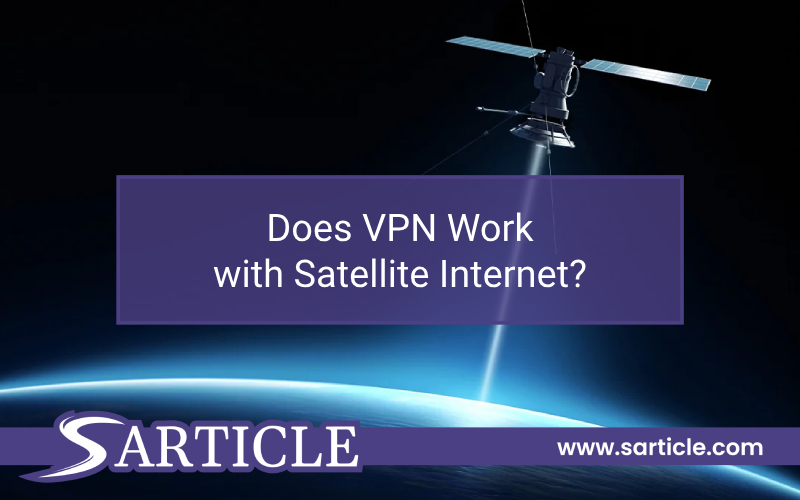In an increasingly interconnected world, the need for secure and private internet connections has never been greater. Virtual Private Networks (VPNs) have emerged as a popular tool for safeguarding online privacy and security. However, when it comes to satellite internet, users often wonder if VPNs are compatible with this unique form of internet access. In this in-depth article, we’ll explore the relationship between VPNs and satellite internet, addressing common questions and concerns to help you make informed decisions about your online privacy.
Understanding Satellite Internet
Before diving into the compatibility of VPNs with satellite internet, it’s essential to grasp the basics of how satellite internet functions.
Satellite internet, as the name suggests, relies on satellites orbiting the Earth to provide internet connectivity. Unlike traditional broadband or fiber-optic connections that use physical cables, satellite internet beams signals to and from satellites in space. This makes it a viable option for users in remote or rural areas where traditional internet infrastructure may not be available.
However, satellite internet comes with its own set of characteristics that can impact its interaction with VPNs.
The Mechanics of a VPN
A VPN, or Virtual Private Network, is a technology that establishes an encrypted tunnel between your device and a server located in a different location, often in a different country. This tunnel encrypts all data passing through it, providing privacy and security for your internet connection.
When you connect to a VPN, your internet traffic is routed through the VPN server before reaching its final destination, effectively masking your IP address and making it appear as if you’re accessing the internet from the location of the VPN server. This process adds an extra layer of security and privacy to your online activities.
VPN and Satellite Internet Compatibility
Now, let’s address the central question: Does VPN work with satellite internet? The answer is yes, VPNs can be used with satellite internet, but there are some important considerations to keep in mind.
1. Latency
One of the key factors affecting the compatibility of VPNs with satellite internet is latency. Latency refers to the delay in data transmission between your device and the remote server. In satellite internet, this latency is inherently higher compared to other types of internet connections due to the distance data has to travel to reach the satellite in space and then return.
When you use a VPN, it adds an extra layer of routing and encryption, which can further increase latency. This means that while a VPN can work with satellite internet, you may experience slower response times, particularly for real-time applications like online gaming or video conferencing.
2. Bandwidth
Satellite internet typically has data caps and limited bandwidth compared to terrestrial broadband. When you use a VPN, it consumes additional bandwidth due to the encryption and data routing processes. This can result in quicker consumption of your allotted data and may lead to overage charges or reduced speeds if you exceed your data cap.
Before using a VPN with satellite internet, it’s crucial to understand your provider’s data policies and select a VPN that is mindful of bandwidth usage.
3. VPN Protocol Selection
Choosing the right VPN protocol can make a significant difference in your experience with satellite internet. Some VPN protocols are better suited for high-latency connections, while others may exacerbate the latency issue. OpenVPN, for example, is known for being robust but may not perform optimally over high-latency connections.
Consider using VPN protocols like IKEv2 or WireGuard, which are designed to be more efficient and responsive, making them better choices for satellite internet users.
4. VPN Server Location
The location of the VPN server you connect to can also impact your experience. Connecting to a server that is geographically closer to your satellite internet gateway can help reduce latency and improve performance. Many reputable VPN providers offer a variety of server locations to choose from.
5. VPN Provider
Not all VPN providers are created equal, and the performance of a VPN can vary depending on the provider’s infrastructure and server quality. It’s essential to choose a reputable VPN service with a track record of providing consistent and reliable connections. Reading user reviews and conducting research can help you make an informed choice.
Benefits of Using a VPN with Satellite Internet
Despite the potential challenges, there are several compelling reasons to use a VPN with satellite internet:
1. Privacy and Security
A VPN enhances your online privacy and security by encrypting your internet traffic. This is especially valuable when using satellite internet, as it adds an extra layer of protection against eavesdropping and potential vulnerabilities in the satellite network.
2. Bypassing Geographical Restrictions
VPN allows you to access websites and online services that may be geographically restricted in your region. By connecting to a server in a different location, you can bypass these restrictions and access a more open internet.
3. Enhanced Online Freedom
Using a VPN can also help you maintain online freedom by preventing your internet service provider (ISP) or satellite internet provider from monitoring or throttling your internet activities.
Conclusion
In summary, VPNs can indeed work with satellite internet, but the experience may differ from using a VPN with other types of internet connections. It’s essential to be aware of potential latency issues, bandwidth considerations, and the choice of VPN protocol when using satellite internet.
When used thoughtfully, a VPN can provide an extra layer of security and privacy, enabling users to make the most of their satellite internet connections. To maximize the compatibility and performance of a VPN with satellite internet, consider the factors mentioned in this article and choose a reputable VPN provider with a track record of delivering reliable service.
Whether you’re using satellite internet for remote work, online education, or staying connected in rural areas, a VPN can be a valuable tool to ensure your online activities remain secure and private.


